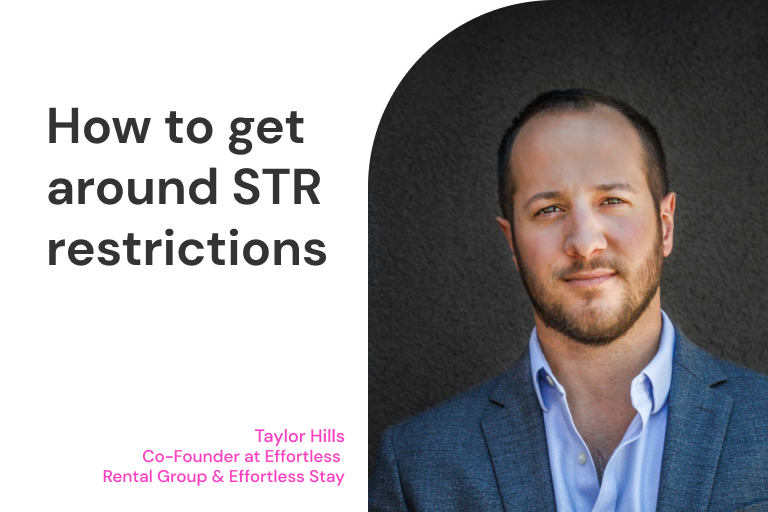When Taylor Hills co-founded Effortless Rental Group in Denver in 2015, the company skyrocketed from two to 100 properties within a year. But when the city rolled out a host of short term rental regulations four years later, they had to pivot drastically to stay successful.
Taylor talks about the sobering realities of STR regulatory constraints and the need to stay agile and ensure you’re part of the wider conversation. His experiences offer invaluable insights for hosts and managers preparing for and navigating STR regulations around the world.
- The early days: rapid growth and no vacation rental regulations
- 2019 Denver short term rental regulations: A game changer
- Adapting to STR regulations: Innovative responses
- The power of community – how to fight STR regulations
- It’s just a matter of time… before you’re regulated
- Should you start a vacation rental in Denver?
- Focusing on the CORE
- Want the latest STR tips and insights at your fingertips?
The early days: rapid growth and no vacation rental regulations
“We saw a huge need for short-term rental management when we started in 2015. This was when the city did not have regulations in place. It was the Wild West. We quickly scaled the company from two to a hundred properties in the first year. And then we branched out to Boston, New York, and other states.”
2019 Denver short term rental regulations: A game changer
The implementation of Denver’s 2019 STR regulations marked a turning point for Taylor and other vacation rental managers in the Rocky Mountain resort. The regulations, still in place today, include a primary residence ruling, which states homeowners can only rent out their primary residence – defined as their place of normal return. The state also implemented a 180-day rule, only allowing homeowners to rent out their property if they’re living there for more than 180 days per year.
Adapting to STR regulations: Innovative responses
Taylor and his team quickly realised they had to change the way they worked and find innovative solutions if they wanted the business to stay profitable. This included shifting to different business models and markets in the context of the stringent new rules.
“We were close to 200 properties and that dropped to 125 when the regulations came into place. We saw quite a few clients drop off based on the new primary residence ruling. Some homeowners turned to long-term rentals when the regulations hit, but we persuaded some of them to opt for a 30-day plus model which meant they could rent out their furnished homes from 30 days to six months and still see significantly higher revenue than if they were just to rent out empty properties for two years. Some clients shifted to that model, but many others sold their properties.”
Another creative workaround was to focus their efforts on condo hotel projects in great locations where they could secure hotel licenses. Homeowners could purchase into a condo hotel, instead of owning a vacation rental, which was subject to the STR regulations.
“The regulations affected our revenue and forced us to become leaner, to utilise the technology within the industry, to maximise revenue for our business and for our homeowners. It’s also shown us there are other markets within Colorado, outside of Denver, we can manage properties in. We’re launching Palm Springs, which is far from Denver, but that’s being onboarded as we speak. So we are looking at other markets where we can expand.”

The power of community – how to fight STR regulations
Apart from pivoting the business strategy, Taylor also became a vocal advocate for fair regulations in the area.
“I believe there should be regulations, as long as they are fair. I don’t think outside investors should be able to come into any state and purchase 200 homes and turn them into short-term rentals. But as locals, we should be able to invest in our state. Many people now prefer to invest in a short-term rental rather than other investment options. Owning a vacation rental does not mean you’re necessarily in the top 1%. Many people at our meetings tell us they have invested in rentals to fund their kids’ studies.”
In his opinion, ensuring tax revenue generated from short-term rentals goes towards the creation of affordable housing would make a lot more sense than imposing heavy-handed regulations that stymie the industry and won’t alleviate the housing supply crisis.
He also believes there should be exemptions to the regulations in Denver for individuals based on their lifestyle.
“The regulations made sense before COVID but now the world has changed, and jobs have changed. The rules create friction for digital nomads or those in the military.”
It’s just a matter of time… before you’re regulated
His story is a call to the vacation rental community to engage in advocacy, understand the regulatory landscape, and adapt business models accordingly.
“For any market that’s not regulated right now, it’s just a matter of time before there are regulations,” Taylor warns. He advises STR owners everywhere to be prepared and proactive.
“It’s a hard business. I think anyone who has managed a property knows this is a very labour-intensive business. It’s all operations. There’s a lot of moving parts. It is a hard business without regulations. So when you compound regulations on top of that, it makes it really daunting.”
Should you start a vacation rental in Denver?
“For any property managers looking to start in Denver, I would make sure you educate yourself on the rules and regulations and also research the market first. Demand in Denver has dropped between 15 and 20 percent, and that correlates with occupancy, ADR, and revenue. There’s a lot of saturation and hotels are booming right now. So make sure you’re looking at outside markets that are viable for your business as well.”
“Understand that if you’re not being regulated on it right now, you will be. So prepare for it and get involved in the discussions before you start seeing the newspaper articles. Start Facebook groups, get the conversation going among hosts, be involved in the meetings, get all shareholders there, cleaning companies, vendors, property managers, and other hosts, and make sure that your voices are heard when the council is discussing changes.”
Advocacy groups such as Rent Responsibly and Mile High Hosts are great local advocacy groups, says Taylor.
Also listen to our podcast interview with John Hildebrand, CEO and founder of Hilde Homes and a leader in the STR community who advocates for fair regulations and sustainable successful futures for short-term rentals.
Focusing on the CORE
Our job is to provide exceptional guest experiences. “We want our properties to be consistent, not decorated exactly the same, but with the same level of quality,” he emphasises. This commitment to quality and consistency is a reminder that, regardless of the regulatory backdrop, the fundamental goal remains to deliver memorable stays for guests. Technologies like vacation rental guest screening help to keep the balance: run sex offender checks and comply with regulations.
Consistency is key – and the one area where hotels still have the competitive edge over vacation rentals, says Taylor. “Guests want to know what to expect. They don’t want any nasty surprises.”
Key Takeaways for STR Owners:
- Stay Informed and Engaged: Understanding and influencing regulatory changes is crucial.
- Innovate and Adapt: Look for creative solutions to navigate regulatory hurdles.
- Prioritise Quality: Consistent, high-quality guest experiences are key to long-term success.
Through advocacy, innovation, and an unwavering focus on quality, Taylor illustrates how hosts and property managers can turn regulatory hurdles into a pathway for growth.

